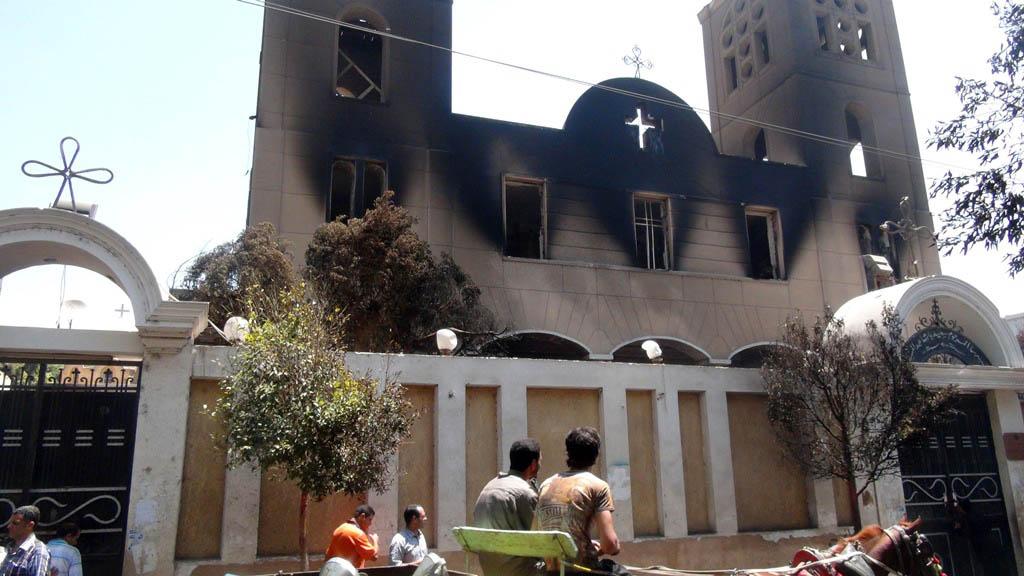As protests in Egypt intensify, anger turns toward Christian minority
A picture taken on August 14, 2013, shows the facade of the Prince Tadros Coptic church after being torched by unknown assailants in the central Egyptian city of Minya. Egypt’s Christians are living in fear after a string of attacks against churches, businesses and homes they say were carried out by angry supporters of ousted Islamist president Mohamed Morsi.
Last week’s fatal clashes between Egypt’s military forces and supporters of ousted Egyptian president Mohamed Morsi signaled a new turn in the country’s unrest.
Over 800 people have been killed in the nearly week-long violent surge following the forcible dispersal of pro-Morsi sit-ins in Cairo and Giza, which the Interior Ministry had earlier promised would take place “with the gentleness of a lamb, in order not to shed any Egyptian blood.”
The violence, however, was not limited to the streets.
Wednesday saw the beginning of a slew of Christian churches, clubs, stores and schools being looted and set ablaze, as Islamic Morsi supporters turned their anger against the religious minority. As many as 52 Coptic Christian churches were attacked throughout the country in as few as 24 hours.
On Friday Egypt’s Orthodox Coptic Church, whose pope had on Tuesday urged all Egyptians to renounce violence, announced its support for military forces in their fight against “groups of armed violence.”
“The Egyptian Coptic Church is following the unfortunate developments on the ground of our country Egypt and emphasizes its strong stance with the Egyptian police, armed forces and other organizations of the Egyptian people in the face of groups of armed violence and black terrorism,” the church said in a statement.
Relations between Christians and Muslims have grown tenser in some Egyptian areas since Morsi’s election in 2012, according to the Christian Science Monitor, finally reaching a rupture on August 14.
“When the mass protests that appeared on June 30 presented an emphatic rejection of Morsi's year-long presidency, some accused Christians of organizing the protests and making up the bulk of the demonstrators,” the article said. “Such statements only increased when Pope Tawadros II, the patriarch of the Coptic Orthodox Church, stood next to General Sisi, with other religious and political leaders, when the army general announced Morsi's ouster.”
Even before last week’s swell, Egyptian rights groups condemned the Muslim Brotherhood for “clear incitement to violence and religious hatred in order to achieve political gains,” following reports of speakers at protest camps organized by the Brotherhood rallying against Christians for their “betrayal” of Egypt.
Nathan Brown, Professor of Political Science and International Affairs at George Washington University, told GlobalPost that while the targeting of Christians is clear, as well the role of the Muslim Brotherhood being in the claim that Christians were behind Morsi’s ouster, the extent of the Brotherhood’s involvement is not.
“Whether the Brotherhood as an organization is actually carrying out these attacks is less clear,” Brown said. “I suspect that they are not organizing them, but I think they can fairly be charged with incitement.”
Brown previously stated that he did not foresee Egypt falling into civil war in the way that Syria has.
“The language used in Egypt and the bitterness of the political divide are both extremely worrying and they are severe enough to raise the specter of civil war,” he said in an earlier conversation with GlobalPost. “But state institutions remain strong and functional and the political divisions do not overlap with sect, region, or ethnicity. Nor are they militarized. For that reason, I do not expect full civil war. But a period of civil strife seems quite possible.”
Asked if emerging violence against Christians breached a new level in Egypt’s unrest that could lead to civil war, Brown maintained his former assertion.
“Prolonged civil strife seems quite possible to me now,” he said. “I do not think full scale civil war is likely. But it is clear that some kind of ongoing violence is possible and Christians could well be victims.”
That possibility is no small consideration, seeing as five percent of Egypt’s population is Chrisitan—that’s more than four million people, according to a Pew Research Fact Tank published today—and an overwhelming 95 percent are Muslim.
Among Muslims, Pew reported, about a third, or 35 percent, say that Egyptian Muslims are hostile toward Christians, while 50 percent say Christians are hostile toward Muslims.
There were no numbers included regarding the percentage of Christians who view Muslims as hostile.
Egypt’s Ministry of Foreign Affairs has used the attacks on Christians to argue for use of force against pro-Morsi demonstrators, accusing international governments and media of intentionally overlooking the attacks and misrepresenting the preceding sit-ins as peaceful.
“The violence that swept the country following the clearing of the sit-ins was the Muslim Brotherhood’s ‘plan B’ for either regaining power or ‘bringing the entire Egyptian house down with them,’” the Ministry’s statement said. “The Rabaa and Nahda sit-ins were not exclusively peaceful gatherings, and they posed a clear danger to Egypt’s national security.”
Presidential Advisor Sekina Fouad agreed, saying that the attacks are simply attempts to “disrupt the Egyptian state’s unity.”
"The MB's attempts are doomed to fail," she added. "They are losing their chance to return to their previous ranks in Egypt again."
The story you just read is accessible and free to all because thousands of listeners and readers contribute to our nonprofit newsroom. We go deep to bring you the human-centered international reporting that you know you can trust. To do this work and to do it well, we rely on the support of our listeners. If you appreciated our coverage this year, if there was a story that made you pause or a song that moved you, would you consider making a gift to sustain our work through 2024 and beyond?
